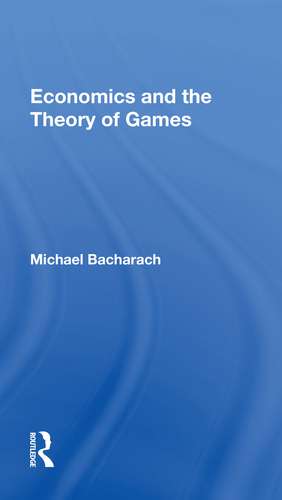Economics and the Theory of Games
Autor Michael Bacharachen Limba Engleză Paperback – 31 oct 2022
| Toate formatele și edițiile | Preț | Express |
|---|---|---|
| Paperback (1) | 242.26 lei 43-57 zile | |
| CRC Press – 31 oct 2022 | 242.26 lei 43-57 zile | |
| Hardback (1) | 736.87 lei 43-57 zile | |
| CRC Press – 18 dec 2020 | 736.87 lei 43-57 zile |
Preț: 242.26 lei
Preț vechi: 301.26 lei
-20% Nou
Puncte Express: 363
Preț estimativ în valută:
46.36€ • 48.53$ • 38.36£
46.36€ • 48.53$ • 38.36£
Carte tipărită la comandă
Livrare economică 07-21 aprilie
Preluare comenzi: 021 569.72.76
Specificații
ISBN-13: 9780367171742
ISBN-10: 0367171740
Pagini: 174
Dimensiuni: 127 x 216 x 23 mm
Greutate: 0.2 kg
Ediția:1
Editura: CRC Press
Colecția CRC Press
ISBN-10: 0367171740
Pagini: 174
Dimensiuni: 127 x 216 x 23 mm
Greutate: 0.2 kg
Ediția:1
Editura: CRC Press
Colecția CRC Press
Cuprins
Part I. Theoretical Framework: 1. Introduction and examples; 2. The representation of a game in extensive form; 3. The representation of a game in strategic form; 4. The mixed extension of a game; 5. Mixed and behavioral strategies; 6. Representation in coalition form; Summary; Exercises; Part II. Strategic-Form Analysis: Theory: 7. Dominance and iterative dominance; 8. Nash equilibrium; 9. Zero-sum bilateral games; 10. Nash equilibrium: formal existence results; 11. Strong and coalition-proof equilibrium; 12. Correlated equilibrium; 13. Rationalizability; Summary; Exercises; Part III. Strategic-Form Analysis: Applications: 14. Oligopoly (I): static models; 15. Mechanism design (I): efficient allocation of public goods; 16. Mechanism design (II): Nash implementation; 17. Markets (I): macroeconomic coordination failures; Summary; Exercises; Part IV. Refinements of Nash Equilibrium: Theory: 18. Introduction; 19. Refinements excluding 'incredible threats': examples; 20. Subgame-perfect equilibrium; 21. Weak-perfect Bayesian equilibrium; 22. Refinements excluding 'untenable beliefs': examples; 23. Sequential equilibrium; 24. Perfect and proper equilibria; 25. Strategic-form refinements; Summary; Exercises; Part V. Refinements of Nash Equilibrium: Applications: 26. Oligopoly (II): sequential moves; 27. Markets (II): decentralized price formation; 28. Oligopoly (III): differentiated products; 29. Mechanism design (III): efficient allocation of an indivisible object; Summary, Exercises; Part VI. Incomplete Information: Theory: 30. Introduction and examples; 31. Bayesian games; 32. Bayes-Nash equilibrium; 33. Signalling games; 34. Mixed strategies revisited: a purification approach; 35. Forward induction; Summary; Exercises; Part VII. Incomplete Information: Applications: 36. Markets (III): signalling in the labor market; 37. Markets (IV): insurance markets and adverse selection; 38. Mechanism design (IV): one-sided auctions; 39. Mechanism design (V): buyer-seller trade; Summary; Exercises; Part VIII. Repeated Interaction: Theory: 40. Introduction and examples; 41. Repeated games: basic theoretical framework; 42. Folk theorems: Nash equilibrium; 43. Reputation and 'irrationality': informal discussion; 44. Folk theorems: subgame=perfect equilibrium; 45. Reputation and 'irrationality': formal analysis; Summary; Exercises; Part IX. Repeated Interaction: Applications: 46. Oligopoly (IV): intertemporal collusion in a Cournot scenario; 47. Oligopoly (V): intertemporal collusion in a Bertrand scenario; 48. Markets (V): efficiency, wages and unemployment; Summary; Exercises; Part X. Evolutionary Foundations of Equilibrium: 49. Introduction; 50. Static analysis; 51. Basic dynamic analysis; 52. Evolution in social environments; 53. The evolution of cooperation: an example; Summary; Exercises; Part XI. Learning to Play: 54. Introduction; 55. Reinforcement learning; 56. Static perceptions and Nash equilibrium; 57. Memory, expectations and foresight; Summary; Exercises; Part XII. Social Learning and Equilibrium Selection: 58. Introduction; 59. Evolutionary games: theoretical framework; 60. Evolutionary games: alternative scenarios; 61. Stochastic stability and equilibrium selection; 62. Experimental evidence; 63. Perturbed Markov processes: basic concepts and techniques; 64. Reinforcement learning with flexible aspirations; Summary; Exercises.
Descriere
This textbook offers a systematic, self-contained account of the main contributions of modern game theory and its applications to economics.
